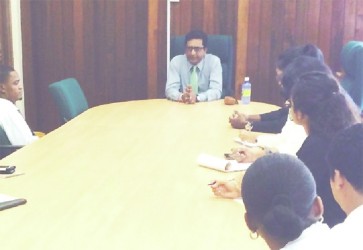Automatic entry for 25 UG students to the Hugh Wooding Law School (HWLS) in Trinidad and Tobago will continue while discussions ensue at the level of Caricom over a wide-ranging review of legal education in the region.
This was the assurance given to University of Guyana (UG) law students on Monday by Attorney General Anil Nandlall, according to a release yesterday from the Ministry of Legal Affairs. He convened a meeting with them in the boardroom of the Ministry of Legal Affairs to assuage concerns over automatic entry this year. Last year, UG law graduates were left in limbo for many months because of a decision by the Council for Legal Education (CLE) not to admit the 25 because of the lack of capacity at its facilities. An interim agreement was later worked out for the batch from last year to be admitted and prospective entrants this year had concerns about whether the automatic admissions would continue.

Nandlall noted at the meeting that a decision had been taken at the level of the CARICOM Heads of Government to write to the CLE and address the issue of continuing admission of UG law students to the Council’s law school, as well as to do a comprehensive review of legal education in the region. This would entail revising the syllabus, revisiting the role the Council is playing, whether the Council should continue to be the provider of legal education in the region, or if it should re-examine its role as simply administering a system that will deliver legal education in the region. The review would also ascertain whether there was adequate accommodation at the law schools in the region to house the continuous increase in the numbers of students pursuing law studies.
Nandlall said that the next decision to be made is the source of funding.
“To undertake what the Heads of Government were recommending, which is a review of the system, is a very costly exercise and an estimation of the cost was submitted to the Heads of Government with discussions on raising the money.” Guyana, he said, stated its intention to contribute to meeting this expenditure and that a common cost would be borne by the entire region.
He said that the CLE, of which he is an executive member, is currently addressing this issue. The release said that he told the students that he will be attending a meeting of the Council in Grenada on February 6, 2015 and this will be on the agenda again.
Nandlall added that there is currently an impasse between the University of the West Indies (UWI) and UG in relation to the continuation of a collaborative arrangement which has been in place between the two of them for the last two decades. He said that UG has put forward some proposals which are being considered by UWI and it is expected that the two universities will arrive at a mutually acceptable solution. It is hoped that that agreement would be taken to the CLE for its approval.
He release said that he admitted that the review process would be a long and protracted one. “However, he did indicate from a short term perspective that the 25 law students will continue to gain entry at the HWLS on the basis of automatic entry, while those outside of the 25 limit will continue to have to write the entrance examinations if they want to attend the HWLS”, he stated.
The AG said that as a representative of Guyana on the CLE, his preference is for a continuation of an arrangement that will continue to associate the UG, LLB programme with that of the UWI, “because I believe that it is important for the integrity of the degree programme and it is important for the quality control mechanism to continue to be in place to ensure that there is no dilution of standards at the University of Guyana.”
Nandlall noted that there continues to be space problems at CLE facilities because of the proliferation of new institutions which are doing LLB programmes within the region. They are producing many law students who are expected to be accommodated at the HWLS. “It simply cannot continue like that,” said the AG.
Nandlall also noted that the Law School in The Bahamas has the space to offset the growing number of graduates wanting to acquire their LLB and practise at the Bar, but the cost of travel, living, and the tuition fees at the institution is very high.




